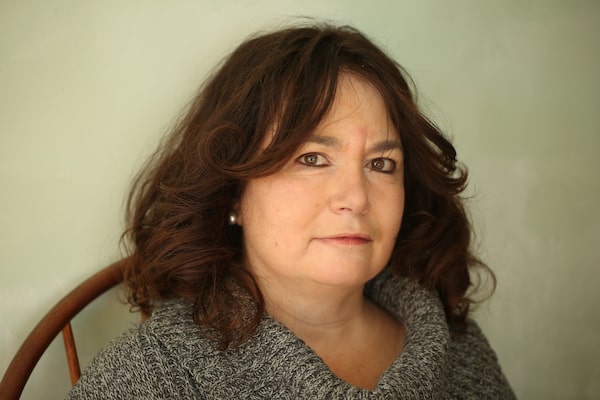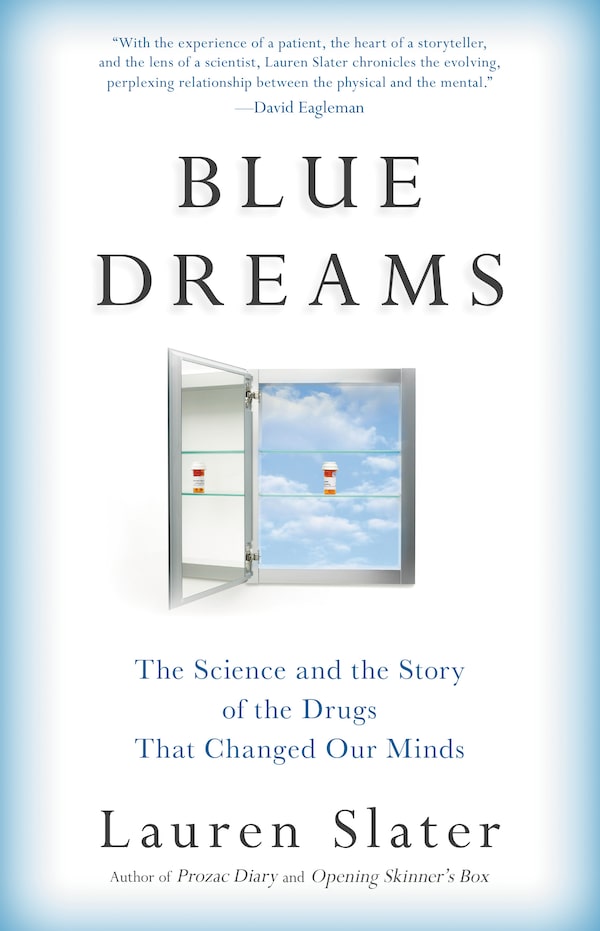
Lauren Slater explores the haphazard nature of the discovery of major psychiatric drugs in her new book, Blue Dreams: The Science and the Story of the Drugs That Changed Our Minds.
Over the past 35 years, Lauren Slater has been on 12 different kinds of psychiatric drugs, including antidepressants, antipsychotics, an anti-anxiety drug and a stimulant.
They’ve not all worked for her, but the ones that have she credits for allowing her to function and take pleasure in life. Their efficacy comes at a steep price, however. At age 54, Slater, the Fitchburg, Mass.-based writer who authored Prozac Diary and Opening Skinner’s Box, describes herself as having the body of an ailing octogenarian. She has diabetes and failing kidneys, both side effects of the antidepressant and antipsychotic Zyprexa. She also has memory issues and is overweight. The drugs she’s come to count on, she says, are shortening her life.
Yet Slater fears going off them. Not only are the withdrawal effects unbearable, she risks the chance they’d fail to work if she were to take them again later. “No one knows why that is,” Slater explains.
Indeed, no one really knows how or why any of the medications she takes work in the first place. Unlike diseases such as diabetes or cancer, which can be identified with blood tests or tissue samples, biomarkers for mental illnesses such as depression and anxiety remain elusive, and the process of determining which drugs work for individual patients is still one of trial and error.
In her new book Blue Dreams: The Science and the Story of the Drugs That Changed Our Minds, Slater, who has a doctorate in psychology, explores the haphazard nature of the discovery of major psychiatric drugs. She delves into the history of medication, from Thorazine and lithium to selective serotonin reuptake inhibitors (SSRIs). She follows psychiatry’s developments all the way to its current revived exploration of psychedelic drugs, such as Psilocybin, the compound found in “magic mushrooms,” and MDMA, also known as ecstasy.
The quest to understand the biology of mental illnesses is critical for creating targeted drugs, Slater says. At the same time, she argues psychiatry needs to unshackle itself from profit-seeking pharmaceutical interests.
Slater spoke with The Globe and Mail about what it’s like to be bound to a potentially toxic cocktail of drugs, the origins of which are fluky, and the true function, unclear.

You discuss the physical toll of being on multiple psychiatric drugs. What’s it like when you’re not taking them?
The withdrawal is so severe, and you get a depression that’s even more severe than the one that caused you to go on the medications. It becomes really scary and I think I’m going to lose my mind and not be able to get it back again.
So I’ll grab onto my bottles of psychiatric medications and I take them again. But it’s hard to know whether the despair I feel when I go off the medications is true despair or whether it’s despair borne of withdrawal symptoms that would recede if I could get through to the other side.
How has learning about the history of antidepressants and antipsychotics affected the way you feel about taking them?
The serendipitous way they’re developed first and attached to a syndrome later, rather than someone saying, “I’m going to develop a drug for depression,” makes me wonder to what degree my response is a placebo response. I mean, I feel hugely helped by the drugs, but I also know that in clinical trials, the drugs didn’t really outperform the placebo most of the time. Learning that has been the most disorienting and distressing fact for me.
Some would point out that we may not know how psychiatric drugs work, but we also didn’t know how aspirin worked until quite recently.
It’s an apt comparison. We see that SSRIs work. I guess the question is does it matter whether or not we know how the drug works? It would be awfully nice to know how the drug worked because it might actually point us to the etiologies of mental illness.
You write: “Perhaps better than any other drug, lithium reveals the extent to which psychiatry is tightly tied to capitalistic corporate interests.” Can you explain?
Lithium is a drug that no one had an interest in producing because it was a salt, it was a naturally occurring chemical. You couldn’t put a patent on it, so there wasn’t really any money to be made in the marketing of lithium.
In the same way, there are drugs that no one is interested in developing, but there’s plenty of evidence they work amazingly well. In the pursuit of patent-able drugs, they are missing a lot – herbs like St. John’s Wort and other medications.
How then might psychiatry untie itself from corporate interests ?
I think drug companies should have no participation or even knowledge of any of the trials that are occurring. There shouldn’t be any more papers written by drug companies that look like they’re written by a single doctor. And there shouldn’t be doctors writing these papers if they work for a drug company in any capacity because the bias is too dangerous.
I think psychiatry can untangle itself from capitalistic concerns, but only by putting distance between itself and pharmaceutical companies.
You explored a few possible reasons for why rates of depression have risen, coinciding with the introduction of Prozac. What do you think is the strongest explanation?
I think it’s because the criteria for diagnosing depression have gotten looser and looser.
In the DSM (Diagnostic and Statistical Manual of Mental Disorders, which is a widely used standard for identifying mental disorders), there’s strict criteria for qualifying for a diagnosis of depression. But when physicians or psychiatrists stray from that criteria and are willing to diagnose pretty much anybody who’s not in a good mood with a depressive disorder, you then have taken mood and pathologized it. Suddenly, a bad mood becomes an illness.
You mentioned psychiatry must “take a step back from its neurological love affair, and recall its roots, which were biopsychosocial in origin.” What would that look like?
You wouldn’t be seeing nearly as many 15-minute “med check” appointments [where a professional reviews a patients’ medications]. To go back to a biopsychosocial model, it would need to investigate the different facets of a person’s life and help the patient to amplify the ones that are going right and reduce the ones going wrong.
Why do you believe psychedelic drugs are the future of psychiatry?
Because there’s nothing really new in the pipeline right now in psychiatry. Something new could come along, and there’s new drugs that are developed, but they’re very much similar to the drugs that are already in existence. But psychedelics, which are old drugs that are now being dusted off and taken down from the shelf, they have a huge effect on the human mind. Often beneficial effects, but not always.
You mentioned you’ve looked into psychedelic drugs for yourself. Are you any closer to finding somebody who will help you get that treatment?
I don’t think so. I met with a psychologist who gives psychedelics to patients, but she said there was no use in my taking a psychedelic as long as I’m on these psychiatric medications because the psychiatric medications would block any response. It’s pretty demoralizing to hear.
This interview has been condensed and edited.
 Wency Leung
Wency Leung